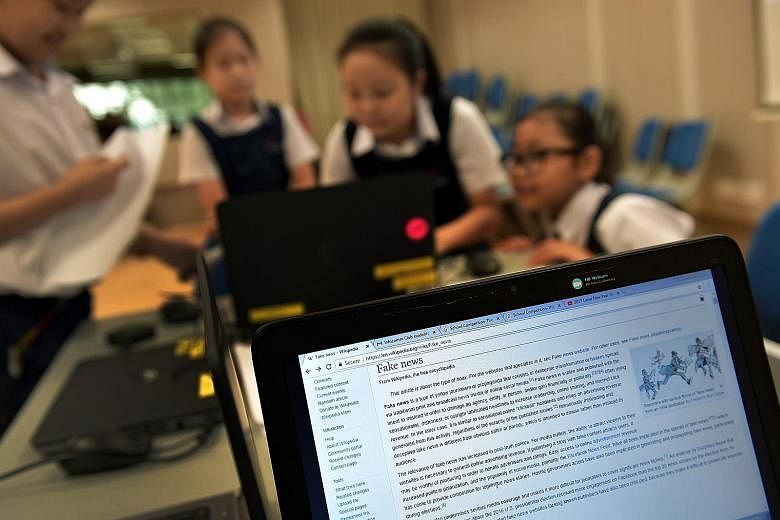A high-level committee of ministers and Members of Parliament tasked to look into ways Singapore can counter deliberate online falsehoods has received 164 submissions, the highest number collected by such a committee.
Media organisations, technology companies, foreign and local academics and experts, commentators as well as members of the public were among those who had written in to the Select Committee on Deliberate Online Falsehoods - Causes, Consequences and Countermeasures.
The Office of the Clerk of Parliament said in a statement yesterday that 79 individuals and organisations have been invited to give their views at the hearings the committee will hold from Wednesday.
The committee was set up in January to recommend how Singapore can tackle online falsehoods, which can range from fake news for commercial purposes to sophisticated state-sponsored disinformation campaigns with political aims.
MPs from both sides of the House had voted unanimously to form the committee after a debate. They also discussed a Green Paper issued by the Ministry of Law and Ministry of Communications and Information on the challenges and implications posed by online falsehoods.
The original deadline for submissions to the committee was Feb 28, but it was extended for a week to let more people write in.
-
Some suggestions
-
Committee of experts to clarify falsehoods
Parliament or the Council of Presidential Advisers to pick experts from the civil service, academia, the arts and civil society for a committee that will clarify fake news that can cause inter-religious and inter-ethnic disputes. Its scope could be expanded when necessary, said Associate Professor Alan Chong of the S. Rajaratnam School of International Studies (RSIS).
Working with alternative and social media companies
Research shows that direct contradiction of fake news can be counter-productive, as people respond best to those perceived to be more similar to them. Given this, the authorities could work with alternative media outlets and social media firms to debunk falsehoods, said RSIS academics Norman Vasu, Benjamin Ang, Terri-Anne Teo, Shashi Jayakumar, Muhammad Faizal and Juhi Ahuja.
Media literacy education curriculum
A curriculum for media literacy education, focusing on reading critically and civic and political participation, could help Singaporeans engage in more informed public dialogue, said freelance journalist Kirsten Han. It should start in primary schools.
Seow Bei Yi
The previous record of 99 submissions was held by the 1988 Select Committee on the Parliamentary Elections (Amendment) Bill.
At the public hearings next week, the committee will get to scrutinise the proposals further.
Those invited to the hearings were "selected to represent a cross-section of different stakeholder groups, or because their written representations require further clarification", said the Office of the Clerk of Parliament.
A concern raised in some of the submissions is the definition of deliberate online falsehoods.
Some said that too broad a definition could end up catching inaccurate speech, while one that is too limited may not be effective in countering the growing problem of fake news.
They suggested a distinction be made between different types of falsehoods, which can range from urban myths to health and financial information to false political news.
Many called for better public education on media literacy, saying that it is the best way to help people develop the skills needed to assess the veracity of information they read.
Others wondered if legislation would be necessary, given that existing laws on sedition, online harassment, religious harmony and telecommunications already punish people for spreading falsehoods online, and allow for the false information to be taken down.
But some felt that both legislative and non-legislative approaches were needed to counter the spread of fake news.
Chaired by Deputy Speaker Charles Chong, the Select Committee comprises nine other members: Home Affairs and Law Minister K. Shanmugam; Social and Family Development Minister Desmond Lee; Senior Minister of State for Communications and Information as well as Education Janil Puthucheary; People's Action Party MPs Seah Kian Peng, Rahayu Mahzam, Sun Xueling and Edwin Tong; Workers' Party MP Pritam Singh and Nominated MP Chia Yong Yong.


